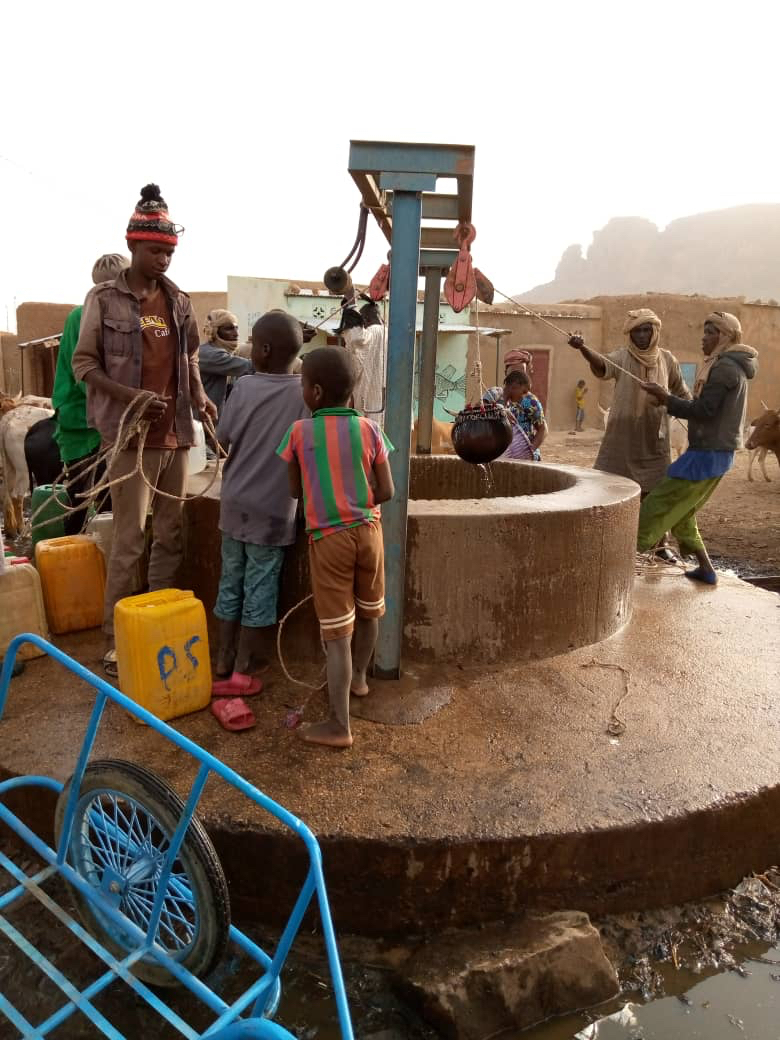Many communities in the Douentza and Bankass circles are subject to water shortage problems. Since 2015, the population of the Seno, an area of plain fields and cliffs, which includes the circles of Bankass, Bandiagara, Douentza and Koro are in the grip of instability due to attacks caused by inter-ethnic crisis. This instability has led to the displacement of people from all sides, with villages completely decimated and families dispersed.
In May 2019, the union of the youth of this area called the Collective of Youth Associations of the Dogon Country (CAJPD) warned about the disruption of the wintering period of the last three years in 42 communes with displaced people spread over 46 communes. At that time, the collective mentioned that 860 water points are no longer functional in the circles of Bandiagara, Bankass, Douentza and Koro. With the evolution of the insecurity situation, these figures are only increasing, further weakening the resilience of the population. This applies not only to the problem of drinking water, but also to water used for socio-economic activities. Water plays an important role in agriculture, one of the main activities of these localities.
As in many areas of Mali, economic activity in these areas is based on agriculture, livestock and trade. After the harvest period, the population, especially the women, practise gardening. While the rainfall situation is characterised by the rapid drying up of water. “During the rainy season, we are confronted with insufficient rainfall, locust attacks and insects. After the rainy season, we do gardening in order to earn enough to meet our needs,” explains Issa and Fatouma Togo, both farmers and gardeners in Bankass. The farmers in these areas justify gardening by the fact that they are often faced with food shortages. “To get by after the rainy season, instead of standing there with my hands crossed, I do some gardening,” says Amadou Lougue from Bankass. Unfortunately, these gardeners are facing difficulties, including insufficient water, which prevents them from watering their gardens. According to Amadou S. Togo, there are water towers in Kani Bozon, but the amount of water is insufficient for the population.
The situation becomes even more alarming when it comes to remote villages. In Sabloulo, a small village in the commune of Koubel Koundia in the circle of Douentza, Aissata T., a married mother of 6 children complains:
“The great difficulty we are facing, and not the least, is water shortage. We have no water. We don’t have a pump or a well and our only source of water is the marigot (a small pool of stagnant water) which will soon dry up, and welcome the diffulties of life until the winter. We are poor and besides being in a small village in a remote commune, the authorities don’t care about their people, about us.”
According to Sidiki Lougue, a farmer in Dimbal in the Bankass circle, population growth as well as the migration of the displaced is the major factor for the lack of water, which continues to increase every day in his locality. It is very urgent that the competent authorities make the issue of water a priority in these areas. “We are asking for the support of NGOs to help reduce this problem,“ asks Yessa Togo, a resident of Kani Bozon commune.
This water problem is not limited to Bankass and Dountza, several other areas, including the V4TA intervention sites of Macina and Bougouni are facing this issue.


